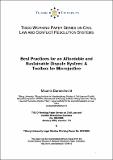|
Reseña:
|
Many people lack access to justice for urgent legal needs, although the value of protection of their rights is high. Can justice be affordable for people with less than $2 a day to spend? Access to justice studies usually investigate the barriers to justice and suggest ways to remove them. This paper follows an alternative approach. Justice is seen as a set of goods that must be produced and delivered by people to other people. For access to justice to become available, five key dispute resolution tasks should be facilitated by services performed at costs that are affordable to users. The paper collects how best practices that can be derived from the disciplines that study dispute. It sketches how they may be combined in a low cost dispute system ran by a “Microjustice Facilitator.” The conclusion is that these five essential services are not inherently costly to produce for people with limited resources, although there are still many gaps in our knowledge about providing them efficiently, which calls for coordinated innovation processes. It is also likely that the transaction costs associated to delivering justice are part of the problem and the market for justice should be studied more thoroughly. |

